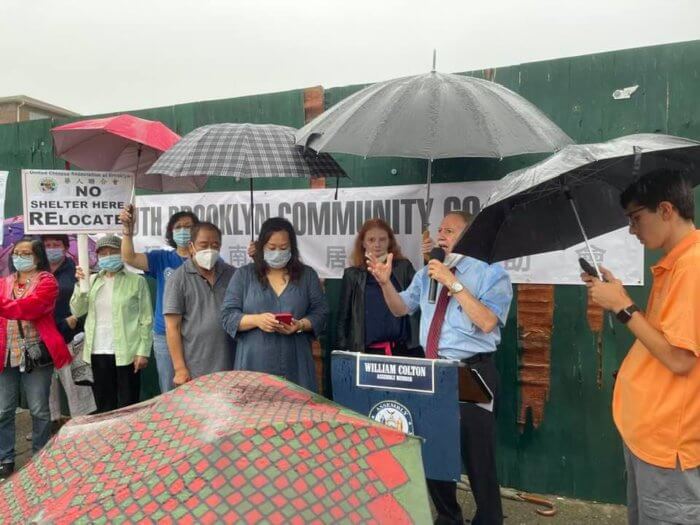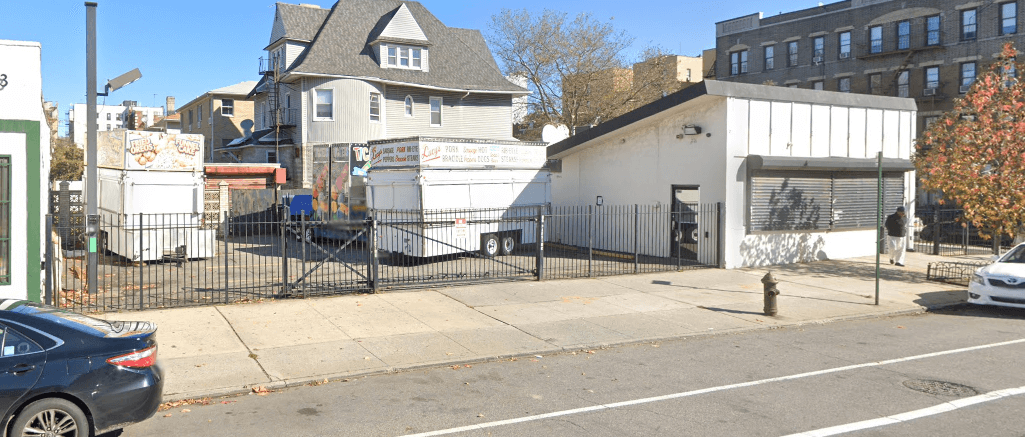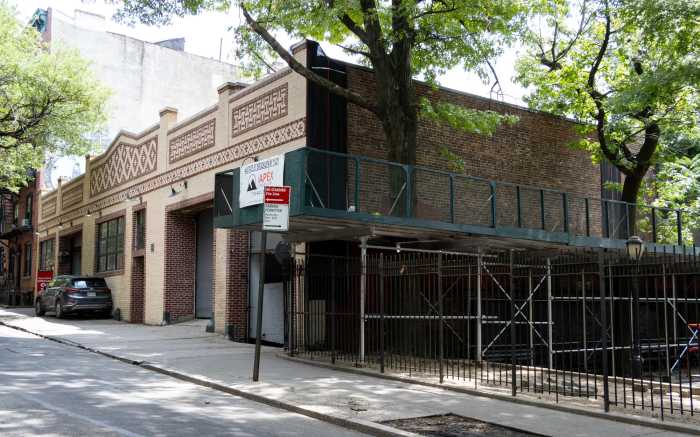A southern Brooklyn community is eagerly awaiting the city’s decision on whether to construct a homeless shelter in their neighborhood, with many expressing fierce opposition to the plan.
Department of Homeless Services notified Community Board 11 of plans for a 150-bed men’s homeless shelter at 2147 Bath Ave. in Bath Beach — where a former Enterprise rental car currently stands — in December 2020, and the announcement raised immediate concerns about the location that was picked without consulting the board.
The proposed shelter would serve as one of 90 new borough-based shelters, as part of Mayor Bill de Blasio’s “Turning the Tide” initiative — his four-year plan to spread homeless shelters evenly across the city, instead of being mostly concentrated in the city’s poorer neighborhoods, a relic from former Mayor Michael Bloomberg’s administration that was known to purchase property for homeless shelters in cheaper parts of the city.
The shelter proposal in Bath Beach is joined with two other proposed shelters in southern Brooklyn as part of the Hizzoner’s plan — one in Brighton Beach, where DHS is currently searching for alternative sites after proposing 100 Neptune Ave. caused community uproar, and another in Bay Ridge’s Community Board 10, whose district manager told Brooklyn Paper they have yet to be notified of a location.
The agency plans to construct one homeless shelter in each of the city’s 90 community districts and finally abolish controversial “cluster sites” — private apartments rented by the city government to house homeless people, usually at a high cost to taxpayers.
DHS’s former assistant commissioner of government affairs and external relations Matthew Borden said in January a new borough-based shelter had been announced in all but three community districts across the city.
As homeless shelters are considered emergency resources, they are exempt from the city’s lengthy land use review process, and city homeless services are only required to provide a 30-day window for community input.
That will change, however, when a bill introduced by southern Brooklyn state Sen. Diane Savino goes into effect in 2022 that requires the city to hold a public hearing before building a shelter. The legislation originally intended homeless shelter projects to go before the lengthy land use review process, also known as ULURP, but, after pushback from the city, the bill’s text was loosened to require just a single public hearing.
Community Board 11’s chair maintains that the board is not against housing homeless people in their neighborhood, rather it is not the right location. Among the panel’s chief concerns are zoning conflicts and the area’s need for family housing — which the head told homeless services officials at a January special board meeting on the proposal and reiterated to Brooklyn Paper on Aug. 12.
“We are certainly not doing NIMBY here,” said William Guarinello at the January meeting. “We don’t know if this is the actual right site for this.”
While there would still be issues with over-saturation, the chair said in January that the immediate area has more services suitable for the needs of homeless families and that it would help with the estimated 1,200 families living in temporary housing in their local school district.
“We now have in Bensonhurst 1,200 families that are in temporary housing,” Guarinello said, “so we sort of from a community board perspective felt that it was sort of misaligned. This should have more been a family shelter if you were going to try to serve our homeless in our community.”
And it seemed for a small period of time that their request for family housing was granted, as the shelter’s contracted service provider, the Institute for Community Living, sent a letter to the board and the district’s elected officials on June 2, stating that DHS would not move forward with the men’s shelter, but rather a 50-bed family shelter at the same location. The letter was made public by the local assemblymember.
But Guarinello told Brooklyn Paper DHS flipped the script when, prompted for an update at the end of July, the agency said they were looking for alternative locations for a men’s shelter within the district and if no other locations turned up, they would move forward with the Bath Avenue site.
“The community is united”
Meanwhile, the area’s assemblymember has been spearheading an activist campaign against the proposed homeless shelter, and said that he and the community will continue to make their voices heard until 2147 Bath Ave. is off the table.
“The city has said that they are looking to see if they can find an alternative site,” Colton told Brooklyn Paper. “To me, until they find an alternative site, this community is not going to say, ‘It’s all over, it’s done,’ we are going to still be aroused.”

Colton most recently organized a rally on Aug. 8 that saw 150 people come out in the pouring rain to echo the community board’s position on 2147 Bath Ave. being the wrong place for a shelter.
“I was amazed over 150 people were standing out there,” he said, “and the reason they came out and the reason we set this rally up is this location is simply the wrong place to put this type of a program.”
The pol has also organized an online petition, and the August rally followed in the footsteps of several other demonstrations and informational meetings hosted by Colton since the plan was first announced in December — a wave he says has shown the community is united in opposition to the shelter.
“The community is united with one voice, solidly against it,” said Colton. “We are getting hundreds of thousands of petition signatures, we’re going to be going out and having more informational meetings.”
Location aside, the state legislator argues that shelters are not the answer to the city’s homelessness issue — and said he has supported a bill currently awaiting signature from the governor to convert distressed hotels into permanent housing at affordable rents.
Colton told Brooklyn Paper that his office’s next point of action is getting the support of local churches and other community organizations.
“Our strategy is we are going to be reaching out to churches and to other community organizations, particularly churches,” Colton said. “Our message is very simple: We are not against helping homeless people, but we need a permanent solution.”
Tools of bureaucracy
Meanwhile, the local community board has exerted the tools they have handy to attempt to block this project — rejecting the recently proposed hotel text amendment in city zoning laws that is going before community boards citywide, passing a motion to refuse negotiations with the shelter’s service provider and sending a letter to the city government calling for a moratorium on shelters until the next mayor comes into office at the board’s June meeting.
And if it comes to that point, Guarinello told Brooklyn Paper they are prepared to file an Article 78 against the proposal as the area is only zoned to allow for minimal commercial uses intended for spaces like neighborhood grocery stores.
He said a homeless shelter is designated a transient hotel in New York Zoning Law as was upheld by the New York Appellate Court, which requires a special permit in the R5/C1-2 zoning district 2147 Bath Avenue is situated in, he said in January.
When a special permit is needed, the applicant typically has to go before the local advisory board, in this case Community Board 11, which Guarinello argues the city would override if they do not hold a public hearing.
A questionable history
Opponents like Colton further claim that the shelter’s developer, the Sandhu Group, is buying up property across the city to build homeless shelters under the guise of hotels that he says feature dormitory-style bathrooms and cramped rooms — an uncommon structure for a hotel nowadays.
The assemblymember also flagged fines the developers’ other projects have been hit with, and asked neighbors to be vigilant in making sure there is no unlawful construction at their Bath Avenue location.
Brooklyn Paper was able to confirm through extensive research that Tejpal Sandhu and Amritpal Sandhu — the two developers named by Colton — are both behind a number of incoming transient hotel constructions across the city. The search was unable to find both Sandhus listed on one application but they both use the same architectural firm — Queens-based MS Savani Architects.
Both Sandhus work under a number of subsidiaries that include Superior Globe LLC for the Bath Avenue site, Superior Glen LLC, 109 Port Richmond LLC and Atlantic East NY LLC to name a few.
Brooklyn Paper was unable to confirm the size of the rooms in the planned hotels or the bathroom layout, though New York Yimby reported that plans for a three-story hotel in East Flatbush by Amritpal Sandhu included 85 hotel rooms averaging 227-square-feet apiece. CNBC reported that the standard hotel room in the United States in 2015 was at least 330 square feet.
Amritpal Sandhu was also one of 14 charged in 2017 for his connection to a construction fraud scheme that fabricated inspections and permits for unapproved construction work.
Still, a need persists for ‘housing with integrity’
The need for more homeless shelters in New York City has only increased amid the COVID-19 pandemic, as 19,596 single adults slept in shelters in June 2021, nearly matching an all-time record, according to the advocacy group Coalition for the Homeless.
The Institute for Community Living, a New York-based nonprofit selected to operate the Bath Avenue shelter, has been serving New Yorkers in need for 30 years through a variety of programs— offering housing, mental health and integration services to 10,000 people of all different backgrounds, according to a company bio on DHS’s website.
Its chief operating officer and executive vice president Pam Mattel said they have standards for their facilities “to responsibly house people with an enormous amount of dignity and respect,” and said the Bath Avenue site is expected to have backyard space, a dining room, social activity space, double or triple rooms and sufficient bathrooms for their occupancy.
With their inner network of services, the nonprofit’s vice president said they are able to provide their residents any service they might need whether at the site or at their other centers or clinics in Brooklyn if those services don’t have a presence in the immediate area of the incoming shelter.
“We have a whole array of services that support our clients on-site,” said Jeanine Costley at January’s special meeting before the community board. “We have that directly within our organization as well as right as on-site.”
Men living in the proposed shelter would be employed, or in the immediate search for work, Costley said, and their services would help the residents transition into independent living.
“The clients that would live in this shelter are single adults, and it’s an employment shelter for men,” she said. “So these are individuals who are working, and are looking to work, and that we are assisting with helping them gain that independence.”
At Bath Avenue, they will offer services like interview skills, helping clients get to work on time, providing appropriate clothing and such skills that would help residents acquire and retain a job, Costley said.
The city is building single-adult shelters across the city because that is where the most need is and for the agency to be able to get the most people into beds at night, Borden said at a January meeting.
“We have seen a continued increase in the number of adults entering the system,” he said. “When we are looking how do we make sure everyone has a bed that’s where the need is.”
A representative from city’s Department of Social Services, which oversees DHS, highlighted that there is currently no DHS-operated shelter locations in Brooklyn’s Community District 11 and therefore was a target area as part of the agency’s initiative to evenly spread shelters across the city.
DHS is currently searching for alternative sites to 2147 Bath Ave. within the same community district in response to local input and will provide notification when they plan to move forward with a location, the representative said, as part of the agency’s commitment to engage with the impacted communities.
The Institute of Community Living declined a request for comment.
Update (Aug. 24, 2:17 pm): The story has been updated to include comments on background from a representative for DHS.

























